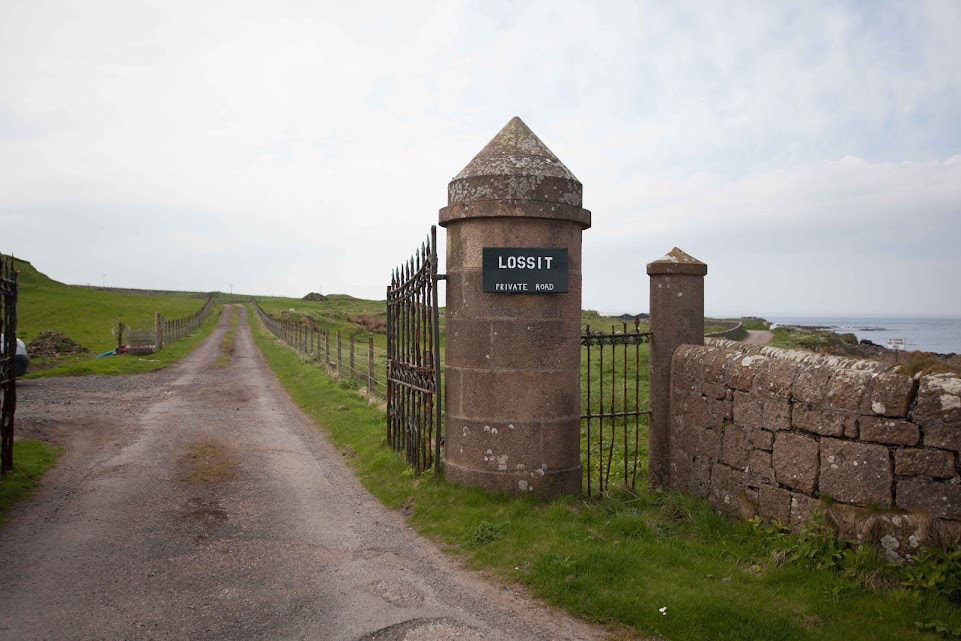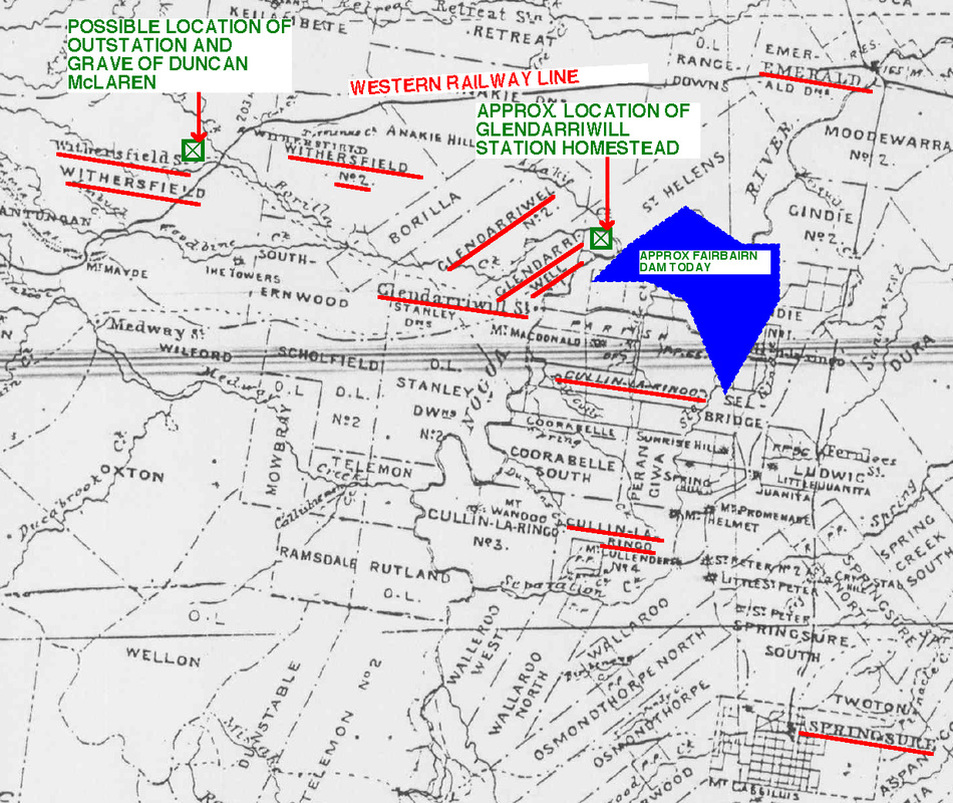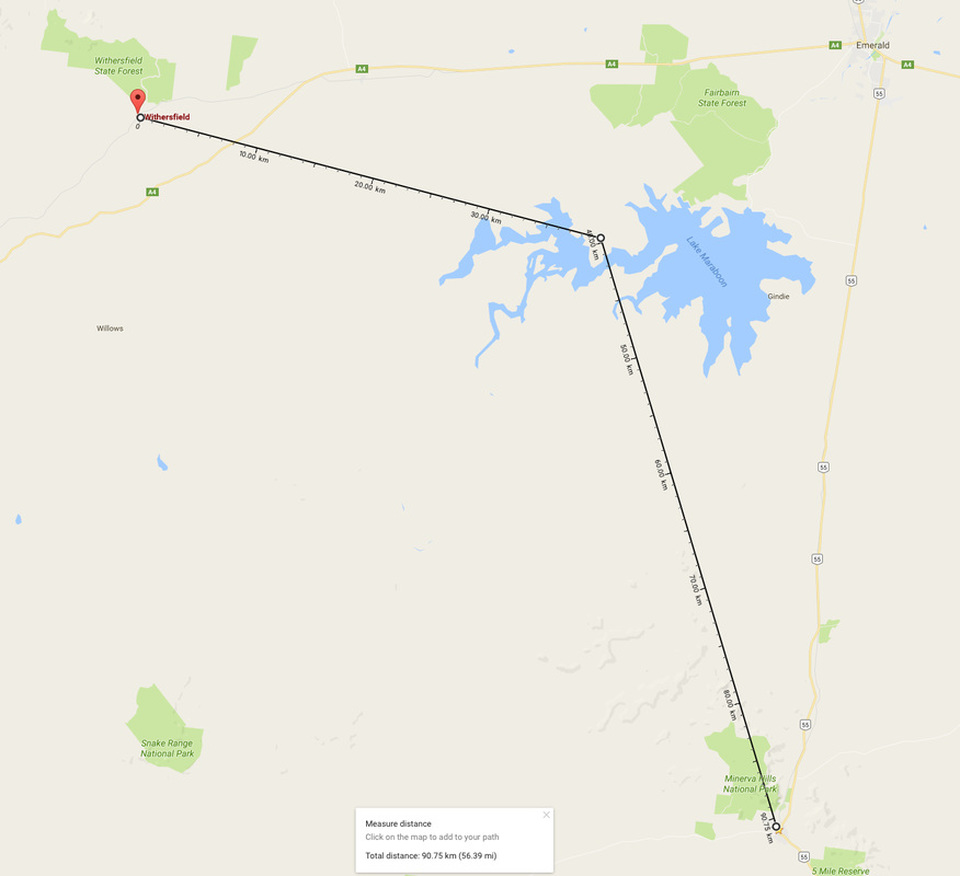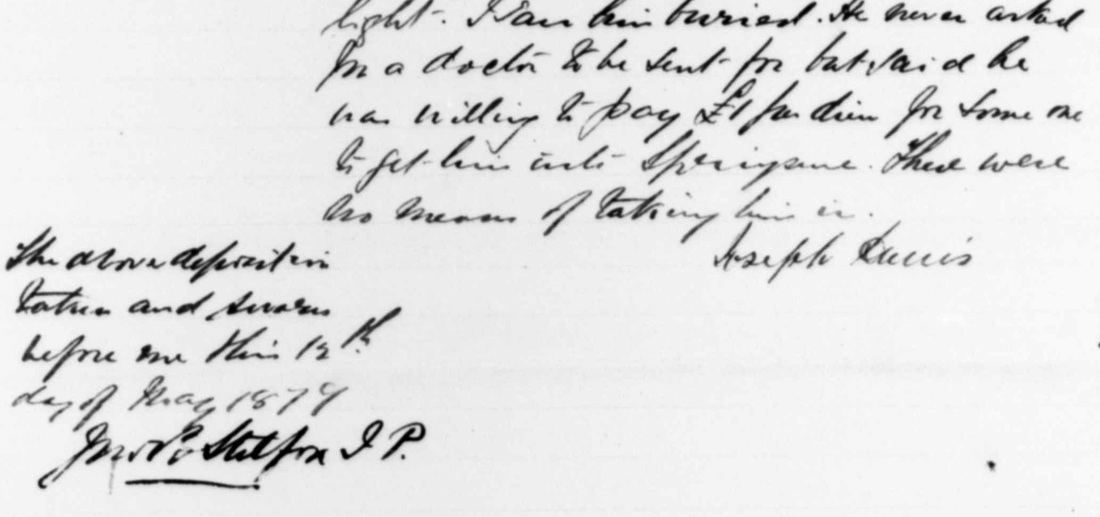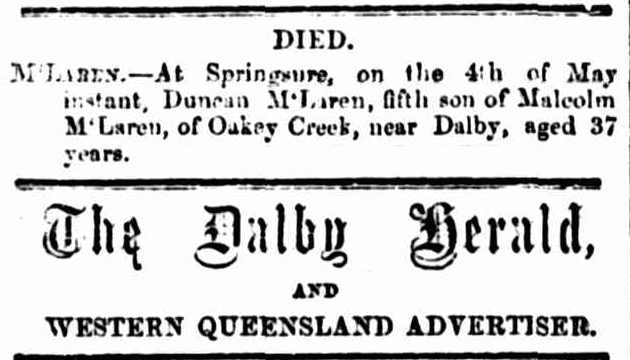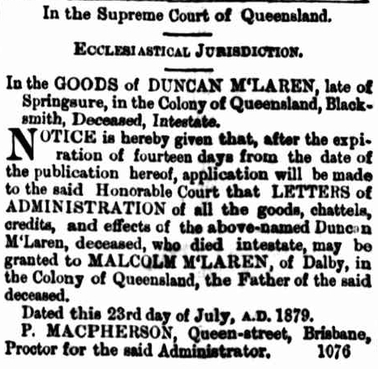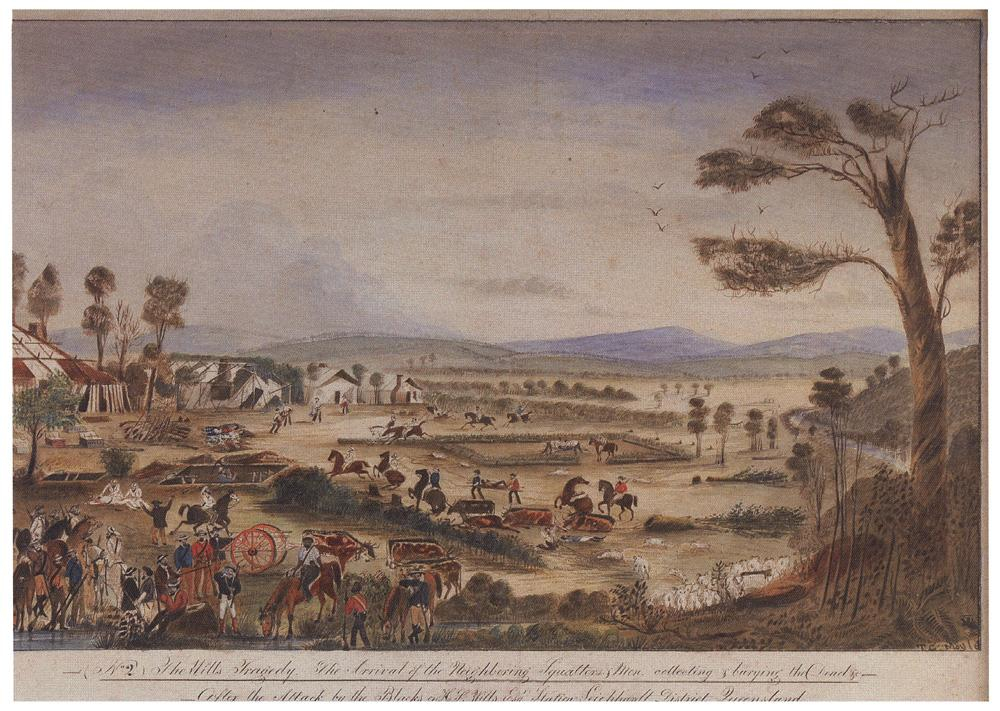1836 Duncan McLaren's Southend birth record.
Duncan McLaren 1836 - 1879
ON THIS PAGE - Major events in Duncan's life in chronological order.
LINKS TO OTHER PAGES WHERE DUNCAN IS MENTIONED - Jane McShenoig; Oral History, Dalby Allotment Sales
LINKS TO OTHER PAGES WHERE DUNCAN IS MENTIONED - Jane McShenoig; Oral History, Dalby Allotment Sales
1851 UK Census - Duncan McLeoran worked as a "cow herd" at High Lossit.
2018 Gates to Lossit Estate
Duncan was born on 14 Feb 1936 at Feorline, near Southend, Scotland. The 1851 UK Census records he was working at High Lossit, a farm near Machrianish, not far from Glenedarachne farm where brother Donald was employed or from where his father and his second wife and child, Archibald, were living at Lecknacreive.
Records show Duncan McLaren was an itinerant blacksmith/shearer/shepherd during his 26 years in Australia. Little is known about him, apart from what can be gleaned from his land purchase in Dalby in 1857, a newspaper article in 1862, his mention in the inquest into Jane's death in Dalby in 1868, and the 1879 inquest into his stoic death, in Central Queensland aged 43.
These pieces of information locate Duncan at the following places:
There is no evidence that Duncan McLaren married or had issue. Duncan died intestate and his father, Malcolm, inherited Duncan's estate.
Seven months after Duncan's death, Donald and Clara McLaran named their first child Duncan James McLaran. The information below gives the impression that Duncan was a sober, industrious, self-reliant and cautious man - somewhat akin to his namesake nephew, our much-loved Uncle Dunk (1879 - 1965). It appears Duncan was a jack of all trades just like his brother Donald and at least four of Donald's sons: Duncan, Donald Jnr, Malcolm and Lewis. Donald and Clara had no hesitation to name their first born after him. The same could not be said about Donald and Duncan's half-brother, Alexander.
Unlike Donald, Duncan maintained a low public profile, avoiding court appearances and noteriety in the newspapers. Though there is a scarcity of records about his life, the following documents help paint a picture of Duncan, and even include a physical description - he was around 5ft 9 inches in height, slight build, and dark complexion. As a shearer and blacksmith, perhaps the term "wiry" could be applied to him.
Records show Duncan McLaren was an itinerant blacksmith/shearer/shepherd during his 26 years in Australia. Little is known about him, apart from what can be gleaned from his land purchase in Dalby in 1857, a newspaper article in 1862, his mention in the inquest into Jane's death in Dalby in 1868, and the 1879 inquest into his stoic death, in Central Queensland aged 43.
These pieces of information locate Duncan at the following places:
- 1857 allotment purchase - Dalby area.
- 1862 Murder by Blacks article - East of Springsure, around today's Expedition National Park.
- 1868 Death of Jane McShenoig - Blaxlands (Three Mile Scrub) close to Dalby.
- 1879 Inquest into his death - Cullin-la-Ringo, and heading west towards "the Barcoo" at the time of his death.
There is no evidence that Duncan McLaren married or had issue. Duncan died intestate and his father, Malcolm, inherited Duncan's estate.
Seven months after Duncan's death, Donald and Clara McLaran named their first child Duncan James McLaran. The information below gives the impression that Duncan was a sober, industrious, self-reliant and cautious man - somewhat akin to his namesake nephew, our much-loved Uncle Dunk (1879 - 1965). It appears Duncan was a jack of all trades just like his brother Donald and at least four of Donald's sons: Duncan, Donald Jnr, Malcolm and Lewis. Donald and Clara had no hesitation to name their first born after him. The same could not be said about Donald and Duncan's half-brother, Alexander.
Unlike Donald, Duncan maintained a low public profile, avoiding court appearances and noteriety in the newspapers. Though there is a scarcity of records about his life, the following documents help paint a picture of Duncan, and even include a physical description - he was around 5ft 9 inches in height, slight build, and dark complexion. As a shearer and blacksmith, perhaps the term "wiry" could be applied to him.
1857 Duncan McLaren purchased a Dalby town allotment.
The images above show the purchase price of Duncan's allotment and the spelling employed by the clerk. The allotment he purchased was in Scarlet Street. He paid much less for his allotment than Donald, as it was remote from the (then) centre of town, the Plough Inn.
The images above show the purchase price of Duncan's allotment and the spelling employed by the clerk. The allotment he purchased was in Scarlet Street. He paid much less for his allotment than Donald, as it was remote from the (then) centre of town, the Plough Inn.
1857 Record of Duncan's half-acre allotment purchase for £4/-/6.
Duncan paid only a quarter the price Donald paid for his allotment on "The Old Corner". The spelling of "McLaren" varies from the deed where it is spelt "McClaren" on one occasion.
Duncan paid only a quarter the price Donald paid for his allotment on "The Old Corner". The spelling of "McLaren" varies from the deed where it is spelt "McClaren" on one occasion.
1862 Reported Murder by Blacks
This is the newspaper article which mentions Duncan McLaren. The article is a little confusing - even the editor says the report is "strange". The Expedition Range is located east of Springsure in the area where Duncan worked. For this reason, it is highly probable that the man referred to in the article is our Duncan McLaren.
7 Oct 1862 ROCKHAMPTON. REPORTED MURDER BY BLACKS.
In the local print of the 24th ultimo appears a most extraordinary statement to the effect that a shepherd employed by Miller and Hutchinson of the Expedition Range had been killed by some aborigines a fortnight before, his head having been battered and his throat cut from ear to ear.
It is also stated that some natives went to the home station and spoke in good English with Duncan McLaren a shepherd, who had known some of them a twelve month previous. They told him they came from Messrs Dutton and Steel's and that Mr Walker with some of their friends were coming with sheep to repossess the country. These black gentlemen then twice robbed the shepherd's hut, taking off two double-barrelled guns, one revolver and some ammunition. Under the assumed guise of friendship they attempted the death of another shepherd, but he was not so to be caught and kept on an open treeless plain continually telling them to be off, and threatening them with his revolver. He accused them of the murder of his fellow shepherd which caused them to bolt, but not till they had got away thirty sheep.
The part of the above yarn which seems strange is that which has reference to Mr Dutton and Mr Walker. It does not seem strange that squatters should say such things about Mr Dutton, against whom they have a grudge because his humanity to the aborigines is a witness against their unjust and violent measures. Not much sensation has been caused in town as some people expect the thing to be a hoax or at least exaggerated.
This is the newspaper article which mentions Duncan McLaren. The article is a little confusing - even the editor says the report is "strange". The Expedition Range is located east of Springsure in the area where Duncan worked. For this reason, it is highly probable that the man referred to in the article is our Duncan McLaren.
7 Oct 1862 ROCKHAMPTON. REPORTED MURDER BY BLACKS.
In the local print of the 24th ultimo appears a most extraordinary statement to the effect that a shepherd employed by Miller and Hutchinson of the Expedition Range had been killed by some aborigines a fortnight before, his head having been battered and his throat cut from ear to ear.
It is also stated that some natives went to the home station and spoke in good English with Duncan McLaren a shepherd, who had known some of them a twelve month previous. They told him they came from Messrs Dutton and Steel's and that Mr Walker with some of their friends were coming with sheep to repossess the country. These black gentlemen then twice robbed the shepherd's hut, taking off two double-barrelled guns, one revolver and some ammunition. Under the assumed guise of friendship they attempted the death of another shepherd, but he was not so to be caught and kept on an open treeless plain continually telling them to be off, and threatening them with his revolver. He accused them of the murder of his fellow shepherd which caused them to bolt, but not till they had got away thirty sheep.
The part of the above yarn which seems strange is that which has reference to Mr Dutton and Mr Walker. It does not seem strange that squatters should say such things about Mr Dutton, against whom they have a grudge because his humanity to the aborigines is a witness against their unjust and violent measures. Not much sensation has been caused in town as some people expect the thing to be a hoax or at least exaggerated.
Comment
Springsure is on the direct inland route from Dalby to Clermont. It has been surmised that Donald McLaran may have joined the Clermont gold rush 1864 - 1866. It is possible that Duncan may have joined Donald on such a venture.
Springsure is on the direct inland route from Dalby to Clermont. It has been surmised that Donald McLaran may have joined the Clermont gold rush 1864 - 1866. It is possible that Duncan may have joined Donald on such a venture.
5 May 1879 The death of Duncan McLaren at Withersfield
Duncan passed away at Withersfield Station near the then new railway west from Rockhampton on 5 May 1879. The inquest into his prolonged and painful death provides an insight into his life and his character.
Duncan passed away at Withersfield Station near the then new railway west from Rockhampton on 5 May 1879. The inquest into his prolonged and painful death provides an insight into his life and his character.
A 19th Century map of the Springsure - Glendarriwill Station - Withersfield Station - Emerald area.
Notes:
Notes:
- The modern day Fairbairn Dam on the Nogoa River is located between Gindie No. 1 (part obscured) and Glendarrriwill Station to its west.
- Places mentioned in the story of Duncan McLaren are underlined.
- Cullin-La-Ringo features below in Q & A.
- At the time of this map, Emerald was not a township.
Possible route - Withersfield to Glendarriwill Station to Springsure.
The distances are approximately similar to those quoted by witnesses below, who may have travelled via bush tracks.
The distances are approximately similar to those quoted by witnesses below, who may have travelled via bush tracks.
12 May 1879 Inquest into the death of Duncan McLaren
Certificate of Particulars
I hereby certify that on the seventh and twelfth days of May 1879, I held an Inquest of Death at the Court House in the Police District of Springsure and that the following particulars were disclosed :-
Name of Deceased Duncan McLaren
Profession or calling Blacksmith; shearer
Height 5 Feet 9 inches
Colour of hair etc Hair and complexion dark
Where found and when Withersfield April 30th 1879
Supposed cause of death Extravasation of urine from rupture of the bladder or urethra, the rupture probably caused by retention of urine or an organic stricture
Names, residences and Callings of witnesses:
John Russell Bell of Glendarriwill
Joseph Davis of Withersfield station, overseer
John Evans, Bush carpenter
Suspicious circumstances Nil
(Signed) JB Stelfox JP
Courthouse Springsure May 7th 1879
I hereby certify that on the seventh and twelfth days of May 1879, I held an Inquest of Death at the Court House in the Police District of Springsure and that the following particulars were disclosed :-
Name of Deceased Duncan McLaren
Profession or calling Blacksmith; shearer
Height 5 Feet 9 inches
Colour of hair etc Hair and complexion dark
Where found and when Withersfield April 30th 1879
Supposed cause of death Extravasation of urine from rupture of the bladder or urethra, the rupture probably caused by retention of urine or an organic stricture
Names, residences and Callings of witnesses:
John Russell Bell of Glendarriwill
Joseph Davis of Withersfield station, overseer
John Evans, Bush carpenter
Suspicious circumstances Nil
(Signed) JB Stelfox JP
Courthouse Springsure May 7th 1879
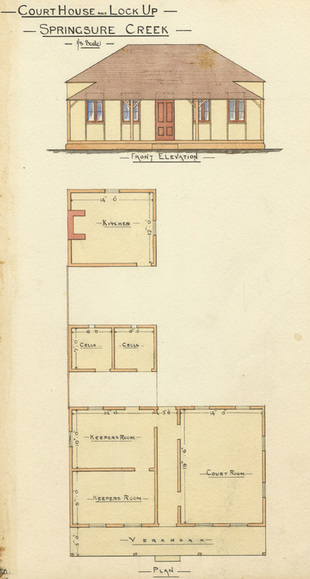
John Bell's Statement
Court House Springsure May 7th 1879
The deponent having been duly sworn states:
My name is John Russell Bell. I am superintendent at Glendarriwill Station 40 miles from Springsure.
The deceased came to Withersfield, one of the outstations, last Monday week April 28th. I did not see him until the following Friday when I thought he looked very ill – had but little conversation with him – never saw him again until about five o’clock last Sunday May 4th - he was then dead.
John Evans saw him die. I did not examine the body. When he arrived, deceased complained of being very ill and said he had not passed any water for two days. He wished to be taken into Springsure and offered a pound a day for anyone who would take him in. Davis the overseer went to try to get a conveyance to bring him in but did not succeed. After failing to get this he came to me to see if he could get one from Glendarriwill. I asked Davis what state the man was in and he said he did not think he would live two days.
I then directed Davis to come to Springsure and get what advice from the doctor he could so as to enable us to get him in. On his return the manager said he could not find the doctor but had seen the police magistrate. He got back on Sunday at mid-day. I said I would get in horses and meanwhile he was to go to Withersfield and bring the man to Glendarriwill where I would have the horse ready to send him on to Springsure.
When Davis arrived he was dead. Withersfield is 25 miles from Glendarriwill.
By the Court: Do not know how long he had been there when it was discovered he was ill – he did not come to the house and make any complaint. When he did complain Davis went over to Mr Turnbull and procured some “poltice” which was administered. Hot preventatives (purgatives?) were also used and these so far as I know were the only measures used.
As far as I know he never requested anyone to go and procure assistance. I never heard of his having done so.
I know deceased was named Duncan McLaren - he has a brother living at Dalby. He was dark complexioned, appeared about forty years of age, was a blacksmith by trade, but has been shearing lately.
The property he had with him consisted of:
two horses,
two saddles,
a bank receipt for £197,
a cheque of Mr Wills,
another £13 or £15,
another one for about £3 by a Mr Aitken.
There were other papers but I do not know anything of them.
The body was interred at Withersfield on May 5th Monday last. The property belonging to deceased is in the hands of Davis.
I believe his death was owing to retention of urine.
(Signed) John N Bell
The above deposition taken and sworn before me this seventh day of May 1879.
(Signed) John B Stelfox JP
Enquiry adjourned until Monday next - May 12th 1879
Court House Springsure May 7th 1879
The deponent having been duly sworn states:
My name is John Russell Bell. I am superintendent at Glendarriwill Station 40 miles from Springsure.
The deceased came to Withersfield, one of the outstations, last Monday week April 28th. I did not see him until the following Friday when I thought he looked very ill – had but little conversation with him – never saw him again until about five o’clock last Sunday May 4th - he was then dead.
John Evans saw him die. I did not examine the body. When he arrived, deceased complained of being very ill and said he had not passed any water for two days. He wished to be taken into Springsure and offered a pound a day for anyone who would take him in. Davis the overseer went to try to get a conveyance to bring him in but did not succeed. After failing to get this he came to me to see if he could get one from Glendarriwill. I asked Davis what state the man was in and he said he did not think he would live two days.
I then directed Davis to come to Springsure and get what advice from the doctor he could so as to enable us to get him in. On his return the manager said he could not find the doctor but had seen the police magistrate. He got back on Sunday at mid-day. I said I would get in horses and meanwhile he was to go to Withersfield and bring the man to Glendarriwill where I would have the horse ready to send him on to Springsure.
When Davis arrived he was dead. Withersfield is 25 miles from Glendarriwill.
By the Court: Do not know how long he had been there when it was discovered he was ill – he did not come to the house and make any complaint. When he did complain Davis went over to Mr Turnbull and procured some “poltice” which was administered. Hot preventatives (purgatives?) were also used and these so far as I know were the only measures used.
As far as I know he never requested anyone to go and procure assistance. I never heard of his having done so.
I know deceased was named Duncan McLaren - he has a brother living at Dalby. He was dark complexioned, appeared about forty years of age, was a blacksmith by trade, but has been shearing lately.
The property he had with him consisted of:
two horses,
two saddles,
a bank receipt for £197,
a cheque of Mr Wills,
another £13 or £15,
another one for about £3 by a Mr Aitken.
There were other papers but I do not know anything of them.
The body was interred at Withersfield on May 5th Monday last. The property belonging to deceased is in the hands of Davis.
I believe his death was owing to retention of urine.
(Signed) John N Bell
The above deposition taken and sworn before me this seventh day of May 1879.
(Signed) John B Stelfox JP
Enquiry adjourned until Monday next - May 12th 1879
John Evan's Statement
Court House Springsure May 12th 1879
This deponent having been duly sworn states:
My name is John Evans. I am a bush carpenter.
I came to Withersfield on April 30th 1879 - on my arrival there about noon, I found deceased Duncan McLaren lying on the kitchen floor in front of the fireplace in a helpless state - there was no one else there.
A man named Prescott came the same day and attended to him as long as he lived. He seemed sensible. He suffered much and complained about stoppage of water. He died on the 5th of this month.
Court House Springsure May 12th 1879
This deponent having been duly sworn states:
My name is John Evans. I am a bush carpenter.
I came to Withersfield on April 30th 1879 - on my arrival there about noon, I found deceased Duncan McLaren lying on the kitchen floor in front of the fireplace in a helpless state - there was no one else there.
A man named Prescott came the same day and attended to him as long as he lived. He seemed sensible. He suffered much and complained about stoppage of water. He died on the 5th of this month.
"he commenced singing and I thought he was getting all right"
He suffered much at times; I heard him groaning once or twice during the night - the every session of that he commenced singing and I thought he was getting all right. I saw Mr Davies there on the 30th.
Everything was done for him that could be done - “poltice” was procured and given to him - I assisted to put him in a warm bath. He wished to be brought into Springsure but there were no means of getting him there - never asked any person to fetch a doctor. I asked him if he had stricture but he gave me no answer.
I buried him, and Mr Hawkins read the burial service.
(Signed) John Evans
The above deposition taken and sworn before me this 12th day of May 1879
(Signed) J B Stelfox JP
Everything was done for him that could be done - “poltice” was procured and given to him - I assisted to put him in a warm bath. He wished to be brought into Springsure but there were no means of getting him there - never asked any person to fetch a doctor. I asked him if he had stricture but he gave me no answer.
I buried him, and Mr Hawkins read the burial service.
(Signed) John Evans
The above deposition taken and sworn before me this 12th day of May 1879
(Signed) J B Stelfox JP
Joseph Davis' Statement
This deponent having been duly sworn states:
My name is Joseph Davis I am overseer at Withersfield one of the out-stations at Glendarriwill.
I first saw the deceased at Withersfield on April 30th ’79, he then said he had been there since the 28th April. He was travelling up the new line, to the Barcoo when he fell sick and came to Withersfield. I was not at home when he arrived - there was no one there when he arrived - there was no one there until the 30th. When I first saw him he was in a helpless state - he told me he suffered from stoppage of water for five days - this was in the evening. Next morning I went to a man who was building a public house on the Withersfield road and got some “poltice” and a tin of mustard. When I got back the “poltice” was given to him and he had a hot bath. I did not remain to see if it did him any good as I had to go to the head station. On my arrival I reported the matter to Mr Bell. I had left a man to attend on him named Henry Prescott.
I came into Springsure on May 2nd on business. Whilst there I made enquiries about the doctor but no one could tell me where he was. I was back at Withersfield on May 5th about one o’clock - McLaren was dead.
I examined his property and made a note of the items. I pulled the cover off him and noticed that the body and legs were much swollen. I believe he died from stoppage of water - everything was done that could be done. After death I looked at the body, the private thighs and lower part of the belly were red and swollen. I rode back to the head station and reported the death to Mr Bell.
Withersfield is 65 miles from Springsure. Deceased was a dark complexioned man apparently from 30-35 years old. His height was about 5 ft 9 inches - build light. I had him buried. He never asked for a doctor to be sent for but said he was willing to pay £1 per day for someone to get him into Springsure. There were no means of taking him in.
(Signed) Joseph Davis
The above deposition taken and sworn before me this 12th day of May 1879.
(Signed) J B Stelfox JP
This deponent having been duly sworn states:
My name is Joseph Davis I am overseer at Withersfield one of the out-stations at Glendarriwill.
I first saw the deceased at Withersfield on April 30th ’79, he then said he had been there since the 28th April. He was travelling up the new line, to the Barcoo when he fell sick and came to Withersfield. I was not at home when he arrived - there was no one there when he arrived - there was no one there until the 30th. When I first saw him he was in a helpless state - he told me he suffered from stoppage of water for five days - this was in the evening. Next morning I went to a man who was building a public house on the Withersfield road and got some “poltice” and a tin of mustard. When I got back the “poltice” was given to him and he had a hot bath. I did not remain to see if it did him any good as I had to go to the head station. On my arrival I reported the matter to Mr Bell. I had left a man to attend on him named Henry Prescott.
I came into Springsure on May 2nd on business. Whilst there I made enquiries about the doctor but no one could tell me where he was. I was back at Withersfield on May 5th about one o’clock - McLaren was dead.
I examined his property and made a note of the items. I pulled the cover off him and noticed that the body and legs were much swollen. I believe he died from stoppage of water - everything was done that could be done. After death I looked at the body, the private thighs and lower part of the belly were red and swollen. I rode back to the head station and reported the death to Mr Bell.
Withersfield is 65 miles from Springsure. Deceased was a dark complexioned man apparently from 30-35 years old. His height was about 5 ft 9 inches - build light. I had him buried. He never asked for a doctor to be sent for but said he was willing to pay £1 per day for someone to get him into Springsure. There were no means of taking him in.
(Signed) Joseph Davis
The above deposition taken and sworn before me this 12th day of May 1879.
(Signed) J B Stelfox JP
Concluding portion of Joseph Davis' statement.
|
Duncan's death notice.
17 May 1879 The Dalby Herald DIED. McLaren. At Springsure, on the 4th of May instant, Duncan McLaren, fifth son of Malcolm McLaren, of Oakey Creek, near Dalby, aged 37 years. Comment Duncan was the 5th son of Malcolm McLaran - this was confusing until the birth of Malcolm's first son Archibald was discovered. |
1879 Part death certificate of Duncan McLaren.
Questions and (possible) Answers:
|
Q1. Could a doctor have saved Duncan?
A1. Today's medical procedures would have saved him. Perhaps the doctor in Springsure if available could have sedated Duncan and cleared his urethra or relieved the pressure with an incision. It is difficult to be sure, but Duncan may have suffered from bladder stones. Bladder stones can be caused by drinking insufficient water. Q2. How long had Duncan been living in the Springsure area? A2. He was in the area in 1862 but was working for Donald at Three Mile Scrub in Dec 1868 when Jane McLaren died. The ecclesiastical jurisdiction stated he was a resident of Springsure. Q3. Where had Duncan recently been employed? A3. Mr Wills, the owner of Cullin-La-Ringo Station, was probably Duncan's most recent employer. Cullin-La-Ringo is famous in Australian history for the 1862 massacre of the Wills family and others. It remains the largest massacre of white settlers by Aborigines in Australian history, and a pivotal moment in the frontier wars in Queensland. Tom Wills, cricketer and founder of Australian rules football, was one of six settlers who survived the massacre. 19 whites died in the massacre but between 300 and 370 aboriginals were slaughtered in reprisal attacks by the native police. Native police were prevented from making an appearance in the Queensland court system prior to the mid 1880's. This was very convenient for the Queensland Government. |
1862 Cullin-La-Ringo, clearing of the dead
|
Q4. The Big Question: With more inducement would the station hands have managed to transport Duncan to Springsure and have saved the day?
A4. The countryside was probably too rugged to allow an easy passage, but with over £200 in his wallet he had the means to offer more that £1 per day for assistance. He certainly died the richest man in the Withersfield cemetery. One can only assume that the station workers did everything in their power to assist.
Sadly, the railway from Rockhampton had not extended this far west in 1879.
A4. The countryside was probably too rugged to allow an easy passage, but with over £200 in his wallet he had the means to offer more that £1 per day for assistance. He certainly died the richest man in the Withersfield cemetery. One can only assume that the station workers did everything in their power to assist.
Sadly, the railway from Rockhampton had not extended this far west in 1879.
The Legacy of Duncan McLaren
Comment
Duncan did not marry and died without issue and intestate. The little we know about him suggests he was a hard worker, abstemious in his habits, and extremely brave in the face of aboriginal threats and death. He may even have had musical talent or liked to sing. His estate was in excess of £200, perhaps sufficient to finally select a homestead.
Duncan has several lasting legacies:
Comment
Duncan did not marry and died without issue and intestate. The little we know about him suggests he was a hard worker, abstemious in his habits, and extremely brave in the face of aboriginal threats and death. He may even have had musical talent or liked to sing. His estate was in excess of £200, perhaps sufficient to finally select a homestead.
Duncan has several lasting legacies:
- the road north of and leading to Kilkevan bears his name;
- perhaps his estate financed his father's purchase of Cockatoo Point which combined with the two adjoining McLaran properties formed Donald McLaran's final Kilkevan holding;
- Donald chose to name his first child, Duncan James McLaran, born Dec 1880, in honour of his ill-fated brother.


